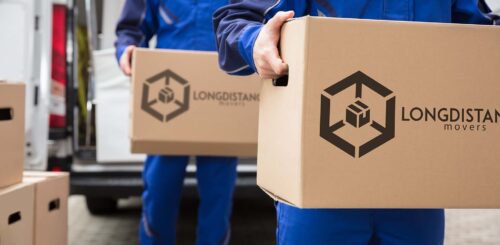Due to the Tax Cuts and Jobs Act (TCJA), from 2018 American citizens are no longer able to request moving expenses deduction, except for soldiers on active duty who move according to the military order. This rule will be applied until 2025 when the suspension will be revised again. Still, there are some states that are still an exception, and where you can claim your rights. If you’re curious about learning your options, stay tuned cause we will provide you with all the information needed.


Moving Expenses Deduction: Qualifications for Claiming Return Outlay on Taxes
TCJA eliminated all taxpayers from the relocation expenses deduction program, except active soldiers due to a military order that requires a permanent change of station. This means that until 2025 only active members of the military will be eligible for claiming tax reduction with the IRS. However, even for this category, there are some basic conditions in order to qualify and exercise their right to reduce relocating outlays. This especially applies to a permanent change of station that implies three possible scenarios:
- A move from home to the first active-duty post,
- A move from one permanent post to the next, or
- A move from the active-duty post to home, within one year of ending active duty or under provisions of joint travel regulations.
In case the soldier fulfills any of these three conditions, they should file the IRS Form 3903 to claim the cost of relocation as a deduction on their federal income taxes.


Which Moving Expenses Are Tax Deductible?
Once the basic conditions are fulfilled and you’re about to file the form with the IRS, you should know what kind of relocation outlays qualify you for tax reduction. So, if you’re asking yourself can I claim moving expenses on my taxes, here is the ultimate list of all outlays any active member of the military can count on for a reduction of their federal income taxes.
Relocation Outlays
All costs associated with the personal belongings and household items like:
- Packing,
- Shipping,
- In-transit storage,
- Hauling a trailer,
- Insurance, and
- Hiring professional long-distance movers
All of these can be considered for reduction. However, you should know that furniture and all other goods bought on a way to your new house are not deductible.
Storage Costs
All outlays associated with:
- Transportation,
- Storing, and
- Insuring,
All are deductible, with a condition that these outlays must take place within a period of 30 days after your relocation.
Travel Outlays
This is the most complex section of all, since many things are excluded from the list, and you should be very careful when reporting the costs associated with the travel process. It also implies keeping a record of all receipts. Use a credit card for paying all the outlays and you will always have an exact record of it.
The outlays you can include in the travel outlay report are:
- Accommodation costs – keep in mind that it doesn’t include meals,
- Car expense – if you use your car to relocate yourself and other family members and goods to the new address,
- Actual expenses proved by receipts – such as the amount you spend on oil, or gas for your car. The standard mileage rate amounts to 16 cents per mile for 2021.
- Parking fees, and tools,
- Airfare outlays.


What Costs Do Not Qualify as Tax Deduction Moving Expenses
Now you have a list of costs that are deductible, it is the right moment to reveal what tax deductions do not include, and what is considered as a matter of personal outlay. Here is the list of non-deductible outlays, that will help you to organize your move in financial terms, and that will help you avoid basic relocating mistakes.
The non-deductible outlays of relocation are:
- Any cost related to house purchase,
- Car registration,
- Driver’s license,
- Any cost related to buying or selling the house, like mortgage and credit, fees or closing outlays,
- Costs of entering into or breaking a lease,
- Home renovations that will help you sell your property faster,
- Any losses associated with the house sale,
- Mortgage penalties,
- Real estate taxes,
- Any changing of carpet and curtains,
- Travel outlays of returning trips to your old property,
- Security deposits (including any given up due to the move,)
- Storage charges.


Which States Allow Moving Expense Deduction?
Although the majority of states have accepted the federal suspension, the great news is there are still some states that are applying return of relocation outlays. Seven states have allowed relocating taxes reduction and continued to exclude relocating reimbursements from income:
- Arkansas,
- California,
- Hawaii,
- Massachusetts,
- New Jersey,
- New York,
- Pennsylvania.
Since this might be a great reason to move to one of these particular states, you should explore all the options and possibilities for starting a life there. For example, what are the best cities in America to raise a family? Or let’s take as an example relocation to the Golden State. You will definitely want to know where to live in California, what are the most affordable places to live in Los Angeles, or what is a cost of living in the City of Angels. Since, honestly, relocating for a job is never easy to do, this detailed exploration of all options will help you not only to adjust to a new town easier but will also help you plan your budget and determine which conditions are most convenient for you.
What Rules Should Other Taxpayers in These States Meet?
The rules other taxpayers should meet in these seven US states that are still allowing reductions on relocation outlays are:
- Starting work test, which implies you started to work within a year from the moment you relocated to that specific state.
- The Distance test, a rule that implies your job must be at least 50 miles farther from your previous house and job location.
- Time test rule that requires enough time you spent working on your new job and location. This time test implies that you’ve been working for at least 39 weeks within a year following your relocation, as a full-time employee or self-employed. For self-employed people there is an additional rule along with a previous one, you need to be working at least 78 weeks during the 24-month period following the move.


Can I Deduct Moving Expenses if My Employer Reimburses Me?
Again, first you should check the rules within a particular state since in many cases employers’ reimbursement can be doubled. How does it actually work and what are relocation questions to ask an employer? In case that the employer reimburses the cost of the move, or discards a relocation bonus, it can be treated as a taxable income. Moreover, once they allow the reimbursement, the employer can no longer claim this given amount as a business deduction on its own tax return.
However, no matter the additional tax outlay, some employers still try to nurture and keep the most valued employees. They usually consult professionals such as accountants or attorneys specialized in this topic to help them out with the paperwork in order to make it lawful.
So, the definite answer in short would be, it depends on the state’s regulations and advice of an attorney or accountant.


The Process of Claiming the Deductions
Once the active military member fulfills some of the above-mentioned conditions it is the right time to start the paperwork process and start filing all the necessary forms with the IRS. The first step is to file Form 3903 and submit it with their tax return. This form is required. The second step is to file Schedule 1 (Form 1040). Of course, it should be done with a help of an attorney or accountant that could lead you through the whole process and make it easier and less time-consuming, and stressful for you.


How Can You Save Money When You Can’t Count on Moving Expenses Tax Deduction?
Although you might not be a member of the military and you can not claim the deductions, there are still a couple of ways you can save on relocation. The relocating outlays checklist might look quite different in case you explore the ins and outs of relocating out for the first time budget.
The first rule on the cheapest way to move out of state is to compare relocating quotes and decide which cross-country moving company has the best offer for you. Make sure to explore all the long-distance relocating services and confirm what packing services do they offer and how they can help you with more complex things.
The second possible way to save on relocation is to choose a less expensive move date. Relocating in winter or even relocating during the fall can be more affordable with a long-distance moving company. So, if there is a possibility to avoid relocation in peak season or during the weekends when the demand is the highest, you should definitely consider it.
Another way that could be very useful in decreasing the cost of relocation is selling unwanted appliances and furniture. This will positively affect your budget in terms of acquiring some extra money for things you’ll need for your new house, and will also decrease the outlays of relocation since all appliances and furniture pieces are pretty bulky and heavy so it would cost more to relocate them with you.
Extra Advice on How to Save Money When Relocating
There are a couple of relocating hacks on how to decrease your relocation outlays. Explore how to find cheap relocating supplies, or even free and how they can affect your budget positively, and get ready to move efficiently.
Moving Insurance
All your stuff is secure with Long Distance USA Movers, but in case something does happen to it, there’s a moving insurance policy in place. We offer both basic Valuation Coverage and Full Value Protection.
Learn moreAuto Transport
Move your car across the country in an open or enclosed trailer – for an affordable fee. We offer car transport as a standalone service, but you can bundle it with your household move and get a hefty discount.
Learn moreStorage Services
Our spacious climate-controlled units will protect your things until the drop-off. No need to worry about them because all items are labeled and secure, and each customer gets a dedicated unit mixup isn’t possible.
Learn moreDeductible Relocation Expenses for Military Members, Until 2025 Only?
Although the current rules will be actual until 2025, there is still the possibility this program will change and get back to normal from the period prior to 2017. Since relocation outlays are quite high, especially for cross-country movers, getting back to some old regulation will be more than beneficial for any home budget. Still, there are still options in case you really don’t want to miss this chance of tax reduction. Considering the relocation to one of the seven states, or asking your employer for reimbursement can be a great solution in this period and until the decision is revised again.






